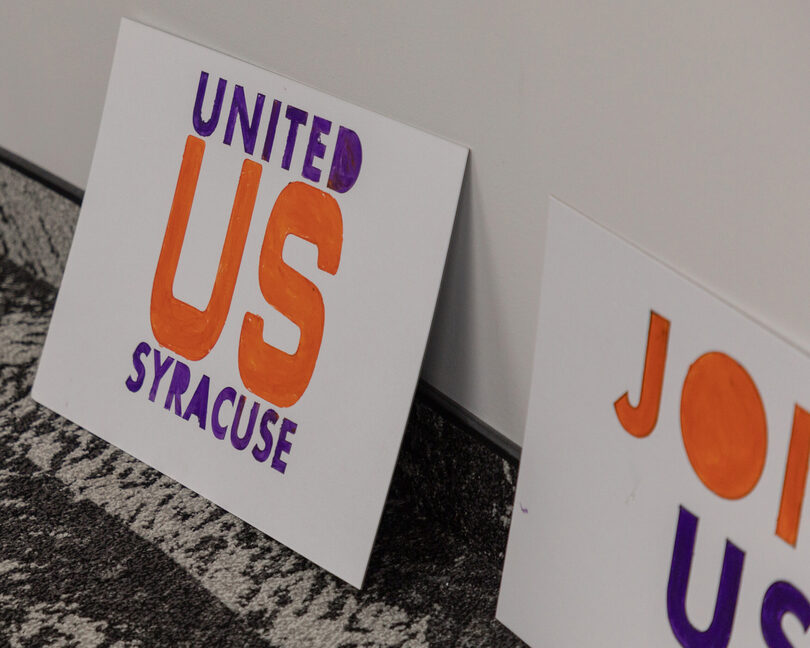United Syracuse advocates for fair wages, transparency for SU employees

United Syracuse, a group of several union chapters on campus, formed this summer to advocate for wage increases and more transparency from SU. Members said they have met with SU officials to discuss their goals. Joe Zhao | Asst. Photo Editor
Support The Daily Orange this holiday season! The money raised between now and the end of the year will go directly toward aiding our students. Donate today.
Since its formation this past summer, the United Syracuse collective bargaining union at Syracuse University has made progress on its goals of improving working conditions for SU employees through meetings with campus facilities, initiatives and petitions.
The union consists of Syracuse Graduate Employees United; Syracuse University Facilities, Food Service and Library Workers; Adjuncts United at Syracuse University and the Syracuse University Chapter of the Association of American University Professors. Hayden Courtney, a bargaining committee member for SGEU and steering committee member for United Syracuse, said United Syracuse works to address workers’ concerns, including below-livable wages, transparency with the university and unfair parking fees.
The university did not respond to a request for a comment about United Syracuse’s claims of below-livable wages and unfair parking fees.
“We wanted to foster kind of a collective worker identity across campus because we’re all workers here and just because our work is different, like job title and what we carry out in our work, we’re still all workers one of the same,” Courtney said.
As part of its efforts to cultivate transparency with SU, Courtney said the union wants more representation and insight in the university’s decision-making processes in terms of how the university uses its money and how it can make conditions better for all workers at SU.
He also said United Syracuse supports the idea that every worker on campus should be in a union, as it gives a voice to the workers so they can advocate for themselves and their benefits.
“That’s the only way that we can necessarily democratize the workplace. One of the last true democratic institutions in America is a union…” Courtney, who is a sociology Ph.D. student, said. “It’s the only way that we’re able to actually get benefits for everybody and actually see working conditions, and a better university for everyone, including students, is that every worker is unionized here on campus, has the protections, and has their material interests looked after.”
Jay Rank, a truck driver and chief union steward for SU Food Services, said a union can accomplish more with people joined together, as opposed to trying to make changes as individuals.
“Bigger numbers, more people will add their voices to the conversation. Everyone’s afraid to talk when they’re one-on-one, but when they see that there’s many people that are willing to talk, they will add their thoughts into the conversation,” Rank said.
One of United Syracuse’s most recent initiatives was a parking petition that asked SU administration to form a committee to address campus-wide parking issues and to increase shuttle services on campus. The union met to discuss this petition on Nov. 2.
Laurel Morton, president of SU’s Adjuncts United chapter, said with the wages that workers on campus are currently receiving, the university’s on-campus parking prices are unreasonable.
“Transportation getting to and from and paying for getting to and from (campus) is a real pain point for quite a few different categories of employees,” Morton said. “It’s a pain point, but it really hits those lower-pay folks.”

Arlo Stone | Digital Design Director
Although United Syracuse is still relatively new, it has already met with SU Service Facilities groups, including Parking and Transportation Services, Morton said. She said members discussed not only issues surrounding parking and transportation but also safety and security when traveling to and from campus with the services.
Courtney said United Syracuse also met with Pete Sala, SU’s vice president and chief facilities officer, to establish a relationship that will allow the union to be involved with decisions on campus. Courtney and Morton both said the meeting was productive, and that this could set the precedent for future negotiations with facilities services on campus.
“We are happy with how administration has been handling this thus far because it seems like they are willing to listen and they’re good at opening this dialogue, and in this way, I think we found a lot of information from this meeting. There’s things that they’re looking into,” Courtney said.
Although the union is progressing its work on its initiatives, Morton said something the union struggles with is being a labor union at a private university. She said many labor unions across the state are in public institutions, leading private universities to be stereotyped as safe and well-funded, therefore making private university union voices less prominent.
“That’s probably one of the general difficulties that is faced, ‘Why did those workers need a labor union to protect them or to protect their employment when they’re working in this enlightened space?’” Morton said.
As United Syracuse continues efforts to improve working conditions at SU, Morton said the group will maintain working relationships with campus facilities because of their recent successful meetings and mutual concerns.
Rank hopes that together, the union can achieve the “betterment” of every worker.
“We all share equal challenges within the university. I think our voice as one means something more than our voices singly,” Rank said.





